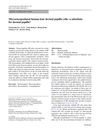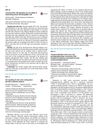Micro-Current Stimulation Has Potential Effects of Hair Growth-Promotion on Human Hair Follicle-Derived Papilla Cells and Animal Model
April 2021
in “International Journal of Molecular Sciences”

TLDR Micro-current stimulation may promote hair growth more effectively than standard treatments.
The study explored the potential of micro-current stimulation (MCS) at 50 µA as a non-pharmacological treatment for hair growth. It was found to enhance hair growth by promoting cell proliferation and migration, activating key signaling pathways (PI3K/AKT/mTOR/Fox01 and Wnt/ß-catenin), and increasing the expression of genes and growth factors associated with hair follicle development in both human hair follicle-derived papilla cells and a mouse model. MCS was more effective than minoxidil, a standard hair growth treatment, in inducing an earlier transition from the telogen to anagen phase, increasing the number of hair follicles, and thickening the skin. While MCS increased the expression of IGF-1 and IGF-1R, leading to an earlier appearance of the hair shaft, it did not affect VEGF-A expression, though VEGF-B was upregulated in both the MCS and minoxidil groups. The study did not specify the number of participants or mice used, which is important for evaluating the strength of the findings.
View this study on mdpi.com →
Cited in this study

research Treatment with Malva verticillata Seed Extracts Alleviates Alopecia via Activation of Wnt/β-catenin Signaling
Malva verticillata seed extracts, specifically linoleic acid, can help reduce hair loss and promote hair growth by activating certain cell signals.

research Hair Growth is Promoted in Mouse Dorsal Skin by a Mixture of Platycladus orientalis (L.) Franco Leaf Extract and Alpha-Terpineol by Increasing Growth Factors and wnt3/β-Catenin
A mix of Platycladus orientalis leaf extract and alpha-terpineol helps mice grow hair by increasing growth factors and cell growth.

research Targeting Wnt/β-Catenin Pathway for Developing Therapies for Hair Loss
Activating the Wnt/β-catenin pathway could lead to new hair loss treatments.

research Macrophage-Derived Extracellular Vesicle Promotes Hair Growth
Special cell particles from macrophages can help hair grow.

research Self-Activated Electrical Stimulation for Effective Hair Regeneration via a Wearable Omnidirectional Pulse Generator
A wearable device using electric stimulation can significantly improve hair growth.

research Ginsenoside Rb1 promotes the growth of mink hair follicle via PI3K/AKT/GSK-3β signaling pathway
Ginsenoside Rb1 from Panax ginseng helps mink hair grow by activating certain cell signals.

research Review of Hair Follicle Dermal Papilla cells as in vitro screening model for hair growth
Dermal Papilla cells are a promising tool for evaluating hair growth treatments.

research Effect of sinapic acid on hair growth promoting in human hair follicle dermal papilla cells via Akt activation
Sinapic acid may help hair growth by activating a specific cell pathway.

research Hair growth-promoting effect of Geranium sibiricum extract in human dermal papilla cells and C57BL/6 mice
Geranium sibiricum extract helps hair grow and is more effective than minoxidil but can be toxic in high concentrations.

research Hair Growth-Promoting Effects of Lavender Oil in C57BL/6 Mice
Lavender oil significantly promotes hair growth in mice.

research Aging, alopecia, and stem cells
The document concludes that both internal stem cell factors and external influences like the environment and hormones affect hair loss and aging, with potential treatments focusing on these areas.

research Hair follicle aging is driven by transepidermal elimination of stem cells via COL17A1 proteolysis
Hair loss and aging are caused by the breakdown of a key protein in hair stem cells.

research Promotion Effect of Apo-9′-fucoxanthinone from <i>Sargassum muticum</i> on Hair Growth <i>via</i> the Activation of Wnt/β-Catenin and VEGF-R2
Sargassum muticum extract and its component apo-9'-fucoxanthinone may help hair growth and treat hair loss.

research Hair growth‐promotion effects of different alternating current parameter settings are mediated by the activation of Wnt/β‐catenin and MAPK pathway
Certain electric currents can promote hair growth by activating specific cell pathways.

research Fibroblast Growth Factors Stimulate Hair Growth throughβ-Catenin and Shh Expression in C57BL/6 Mice
Certain growth factors can promote hair growth in mice by activating hair growth-related proteins.

research Adenovirus-Mediated Wnt10b Overexpression Induces Hair Follicle Regeneration
Wnt10b overexpression can regenerate hair follicles, possibly helping treat hair loss and alopecia.

research Minoxidil activates β-catenin pathway in human dermal papilla cells: A possible explanation for its anagen prolongation effect
Minoxidil helps hair growth by activating the β-catenin pathway.

research Hair loss as a consequence of cancer chemotherapy – physical methods of prevention. A review of the literature
Scalp hypothermia can prevent chemotherapy-induced hair loss but is not suitable for all patients, and more research is needed to improve prevention methods.

research β-catenin Activity in the Dermal Papilla Regulates Morphogenesis and Regeneration of Hair
β-catenin in the dermal papilla is crucial for normal hair growth and repair.

research Medical treatments for male and female pattern hair loss
Minoxidil and finasteride treat hair loss in men, while minoxidil treats hair loss in women.

research Microencapsulated human hair dermal papilla cells: a substitute for dermal papilla?
Encapsulated human hair cells can substitute for natural hair cells to grow hair.

research Hair Loss in Women
Over one-third of women experience hair loss, with female-pattern hair loss being most common, and treatments include minoxidil and possibly hair transplantation.

research Wnt-dependent de novo hair follicle regeneration in adult mouse skin after wounding
Hair follicles can regrow in wounded adult mouse skin using a process like embryo development.

research Control of hair growth and follicle size by VEGF-mediated angiogenesis
VEGF helps hair grow and determines follicle size by increasing blood vessel growth.

research Treatment of Hair Loss
Finasteride and minoxidil are effective for hair loss, but continued research is needed for better treatments.

research Hair Growth Cycle Affects Hair Follicle Destruction by Ruby Laser Pulses
Ruby laser pulses best destroy hair follicles during the growth phase and effectiveness varies with laser intensity; melanin is key for targeting, and timing treatments can improve results.

research STATUS OF MEDICAL TREATMENT FOR ANDROGENETIC ALOPECIA
Minoxidil effectively promotes hair regrowth in younger patients with small balding areas.
Related

research KY19382, a novel activator of Wnt/β-catenin signaling, promotes hair re-growth and hair follicle neogenesis
KY19382 helps to regrow hair and create new hair follicles.

research Canonical Wnt-10b signaling exert an ability of maintaining mouse dermal papilla cells
Wnt-10b is important for keeping mouse skin cells healthy for hair growth.

research CD133-positive dermal papilla-derived Wnt ligands regulate postnatal hair growth
Wnt proteins from certain skin cells are crucial for normal hair growth and renewal.

research Activation of β-Catenin Signaling in CD133-Positive Dermal Papilla Cells Drives Postnatal Hair Growth
Activating β-catenin in certain skin cells speeds up hair growth in mice.

research β-catenin Activity in the Dermal Papilla Regulates Morphogenesis and Regeneration of Hair
β-catenin in the dermal papilla is crucial for normal hair growth and repair.